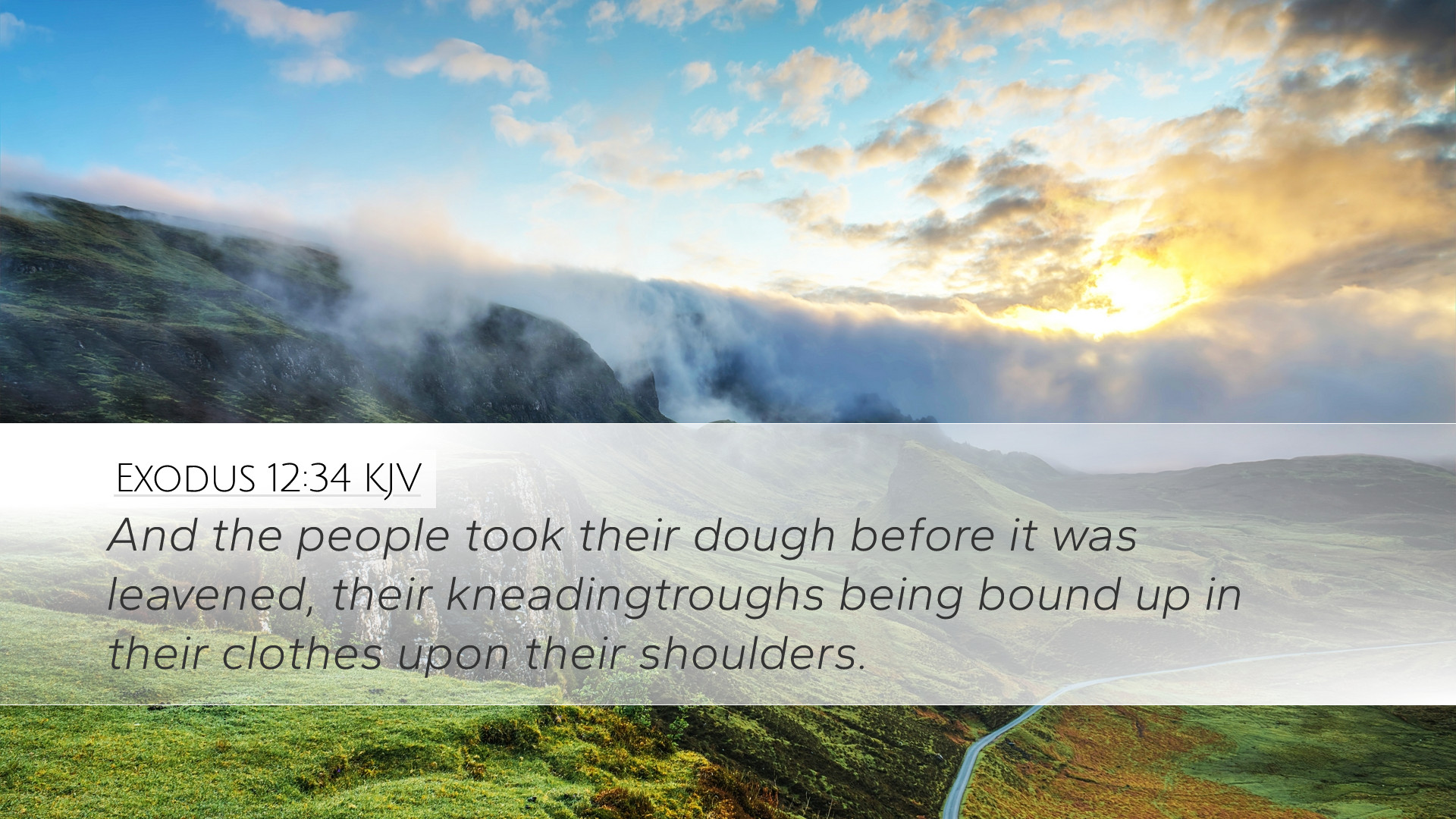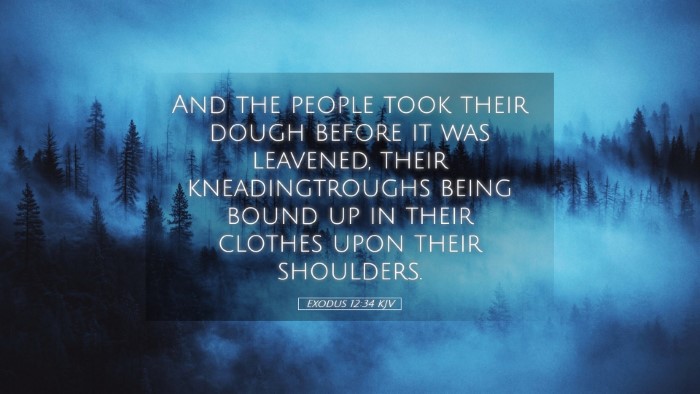Commentary on Exodus 12:34
Verse: Exodus 12:34 (KJV)
“And the people took their dough before it was leavened, their kneadingtroughs being bound up in their clothes upon their shoulders.”
Introduction
This verse occurs in the context of the Exodus narrative, where God commands the Israelites to prepare for their departure from slavery in Egypt. The urgency of the moment is palpable, and the actions of the people reflect a blend of obedience and anticipation for God's deliverance.
Commentary Overview
In examining Exodus 12:34, several key themes emerge: the process of preparation, the significance of unleavened bread, and the urgency of obedience. We will synthesize insights from Charles Spurgeon, Matthew Henry, Albert Barnes, and Adam Clarke to provide a comprehensive understanding of this passage.
1. The Significance of Unleavened Bread
Matthew Henry: Henry emphasizes that leaven symbolizes corruption and sin. The command to prepare unleavened bread signifies the removal of sin from the people’s lives as they are about to be delivered into a new covenant relationship with God. This physical act of preparing unleavened bread reflects spiritual readiness for God’s promise.
Adam Clarke: Clarke elaborates further, indicating that the bread was unleavened because there was no time to allow the dough to rise. This practical detail reinforces the theme of urgency in obeying God's command and highlights the urgency of personal readiness for divine intervention.
2. Urgency of Departure
Albert Barnes: Barnes notes that the Israelites had to prepare themselves for a swift exit. The binding of their kneading troughs signifies their intention to leave Egypt immediately. Barnes points out that this hasty preparation underscores the urgency God places on His deliverance, teaching us that when God commands, we must act without delay.
Matthew Henry: He echoes this sentiment by noting that the haste in preparation reflects their belief in God’s promise of deliverance. The people’s quick actions symbolize faith in God’s providence, which is crucial for the faithful, reminding believers to always be in a posture of readiness for God's work in their lives.
3. Symbolism of the Kneading Troughs
Adam Clarke: Clarke points out the kneading troughs are essential tools for making bread, which also serves as a life-sustaining food for the people. When they bind their kneading troughs and carry them on their shoulders, it represents carrying their sustenance along with their readiness for departure. This illustrates the idea that while they are leaving Egypt, they are also taking the means to provide for themselves in this new journey.
Albert Barnes: Barnes observes that this action also symbolizes their commitment to the covenant God is establishing with them. As they leave the leaven behind, they metaphorically carry with them the tools necessary to sustain their new life under God’s covenant.
Theological Implications
This passage presents rich theological implications concerning sin, obedience, and preparation for God’s deliverance:
- Sin and Purity: The removal of leaven highlights the necessity of holiness and purity in the lives of believers. As the Israelites left Egypt, they symbolically left behind the sin that had ensnared them, connecting this physical action with spiritual readiness.
- Obedience and Trust: The Israelites’ obedience in the face of impending freedom showcases the importance of faith in God's plan. Their prompt action serves as a lesson for Christians today about trusting and acting upon God’s direction swiftly.
- Preparation for Deliverance: The act of preparing food for their journey signifies the importance of being ready for what God has in store. It suggests that believers must actively participate in their own deliverance by preparing themselves for God’s blessings.
Conclusion
In summary, Exodus 12:34 encompasses profound themes of urgency, preparation, and divine deliverance. The insights from prominent commentators illustrate the multifaceted lessons embedded in this seemingly simple verse. As believers reflect on this passage, they are reminded of the importance of holiness, obedience, and readiness for God’s work in their lives. Understanding this verse in conjunction with its context enriches the spiritual narrative of the Exodus and continues to inspire faith and action among today’s believers.


